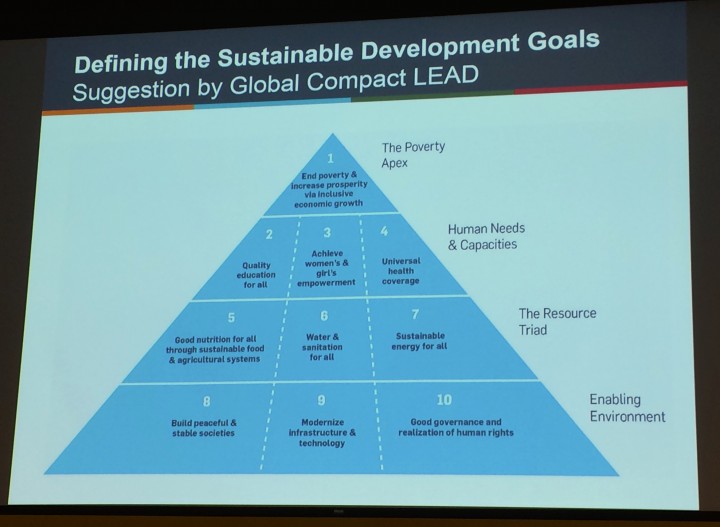 A lot can change in two decades.
A lot can change in two decades.
I went to Cleveland this past week, to the same stage where, eight years ago, a group of business educators committed ourselves to creating the Principles of Responsible Management Education: the Business as Agent of World Benefit Forum hosted by the Weatherhead School of Management at Case Western Reserve University.
Back then, the idea that business ultimately exists to serve society and that it therefore shares the responsibility with other stakeholders to address the world’s most pressing developmental challenges was still considered somewhere between subversive and marginal in the business education establishment. Today, 565 business schools from around the world (including ours) have endorsed six principles that begin with the following declaration:
We will develop the capabilities of students to be future generators of sustainable value for business and society at large and to work for an inclusive and sustainable global economy.
Not that long ago, businesses and business schools were nowhere to be seen when the big questions about global development were at stake. That was the case in 1992, when the United Nations convened the Conference on Environment and Development (Earth Summit) in Rio, even though participants included 172 government officials, 108 at level of heads of State or Government, and some 2,400 representatives of non-governmental organizations.
In September 2000, the UN General Assembly’s Millennium Declaration recognized the need to “develop strong partnerships with the private sector and with civil society organizations in pursuit of development and poverty eradication”. The idea was captured as part of the 8th (and last) Millennium Development Goal, under the rubric of forging a “global partnership for development”.
A couple of months before, in July 2000, then Secretary General Kofi Annan had launched in NY the United Nations Global Compact (UNGC), a collaborative framework for “businesses that are committed to aligning their operations and strategies with ten universally accepted principles in the areas of human rights, labour,environment and anti-corruption” (the anti-corruption principle was actually added only after the United Nations Convention Against Corruption was adopted in 2003). Over 10,000 organizations from 145 countries have since endorsed the Compact, including world giants like Coca Cola and Pepsi, Johnson & Johnson, 3M or Telefónica.
I would have loved to be able to claim that business schools were responsible for triggering this change, but the truth is that educators followed, didn’t lead, corporate attitudes. However it happened, many business schools ultimately joined the movement. During the second UN Global Compact Leaders Summit in Geneva in July 2007, the Principles of Responsible Management Education (PRME) were officially presented to the new Secretary General Ban Ki-Moon. I had the honor of chairing the international group of academics who ultimately produced the six principles and, while the process was more politically complex than I had anticipated, I am proud of the ultimate outcome and the fact that the PRME framework was launched with the support of AACSB, EFMD and other leading business school organizations.
Since 2007, the notion of global corporate citizenship has gradually become less marginal and a more mainstream. Harvard Prof. Michael Jensen, of agency-theory fame, now lectures on leadership and integrity. And Michael Porter, who taught us how to build competitive advantage by overpowering rivals, suppliers and customers, is now the most notable proponent of “shared value” creation.
By the time the UN convened the Conference of Environment and Development again in Rio in 2012 (20 years after the original Earth Summit, thus the Rio+20 name), businesses and business schools were much better represented. In fact, while questions were raised as to the effectiveness of the overall conference in reaching meaningful agreements among nation states, both the Global Compact and PRME were rather productive.
So where are we now?
The Millennium Development Goals are set to expire next year and a new framework is currently being developed under the name “Sustainable Development Goals“. The latest draft includes 17 goals and the UNGC is bringing the perspective from the private sector and is proposing ways to help organize the goals into an easier to communicate framework (as shown in the attached photo). There are two main differences between these new goals and the MDGs. First, they target not only the needs and challenges of the developing world, but of the whole world (rich and poor). Second, the private sector is no longer an afterthought but a central partner in achieving the goals.
With this work-in-progress as background, participants in Cleveland this past week discussed how business schools could take on a key leading role in pushing the new global development agenda. Some of the most far reaching ideas included the following calls for action for business schools, especially those that have endorsed PRME:
- Align their education, research, and engagement agendas with key global development issues as being articulated in the UN’s new Sustainable Development Goals framework;
- Embed new content and transformative learning approaches, including experiential learning, throughout the curriculum in order to develop the competencies necessary for business to tackle our major sustainable development goals;
- Engage in new forms of action research around the major sustainable development issues we face and create new solutions to help business play a more effective role in multiple local contexts;
- Play an active role as public opinion leaders, advisors, solution providers and facilitators to help business become an effective agent of sustainable development;
- Act as impartial facilitators for and between business, government, and civil society.
Interestingly, while some participants congratulated ourselves on the progress that has been made since 2006, one young executive who had just finished a global MBA program jointly offered by a select group of top business schools from different countries shared the fact that her curriculum didn’t include a single reference to global development challenges, UNGC or PRME.
So much work done, so much left to do!
